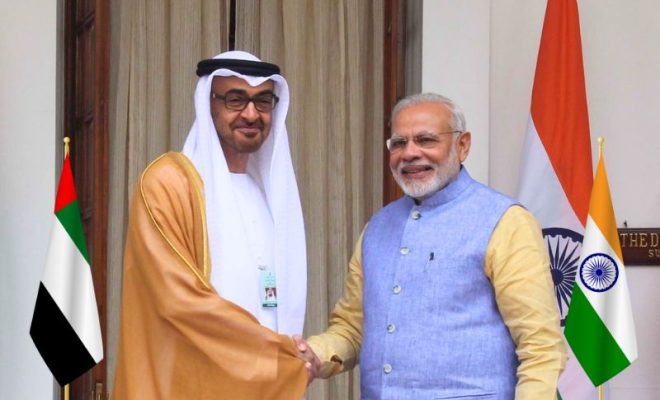India and UAE Forge Stronger Economic Ties with New Bilateral Investment Treaty

Signing a historic Bilateral Investment Treaty (BIT) in Abu Dhabi, India and the United Arab Emirates (UAE), marked a turning point in their increasing economic cooperation on February 13, 2024. Originally signed in December 2013 and slated to expire on September 12, 2024, this treaty replaces the present Bilateral Investment Promotion and Protection Agreement (BIPPA), therefore guaranteeing the continuity of strong investment protection for companies and investors in both countries.
According to India’s Ministry of Finance, the new BIT, which formally comes into force on August 31, 2024, shows the mutual dedication of both countries to deepen their economic links and offer a more safe environment for cross-border investments. The UAE ranks as India’s seventh-largest foreign direct investment, therefore this deal significantly shapes their trade path.
Value of United Arab Emirates as a Principal India Investor
One cannot understate the significance of the UAE among India’s top foreign investors. The UAE accounted for about 3% of India’s total Foreign Direct Investment (FDI), therefore providing almost USD 19 billion over the period between April 2000 and June 2024. Among the several industries these outlays have covered are real estate, industry, infrastructure, and energy. Conversely, India has also made large investments in the UAE; with its Overseas Direct FDI of around USD 15.26 billion, 5% of India’s total outbound FDI over the same time.
Driving development and employment in both nations has been much facilitated by this two-way flow of money. The signing of the new BIT is expected to build on this momentum and create an atmosphere that promotes further investment by means of improved legal protection and economic stability, therefore supporting further development from both sides.
Fundamental principles of the Bilateral Investment Treaty 2024
Aiming at safeguarding and inspiring investments while guaranteeing a balanced approach to manage, the 2024 BIT offers many important clauses. The agreement basically depends on strong legal provisions to stop expropriation without compensation, therefore saving investor assets from unnecessary government intervention. The agreement also precisely outlines financial transfer openness rules, therefore enabling companies to move money across borders with more simplicity and confidence.
The BIT defines it essentially with its closed asset-based definition of investment, which spans a broad spectrum of investment kinds including portfolio investments. This thorough justification guarantees that the treaty safeguards many kinds of investments and helps to clarify this.
Furthermore included in the agreement are guarantees against unfair treatment and the denial of justice for investors, therefore assuring that both nations maintain fair and open judicial systems. This part is rather important in developing investor confidence since it guarantees that under the law investments will be handled legally and equitably.
Investor-State Dispute Settlement System New Approach
The 2024 BIT stands out with an Investor-State Dispute Settlement (ISDS) mechanism, which lets investors pursue arbitration should concerns develop with the host country. Although this ISDS system is designed to give a fair platform for resolving investment-related disputes, it also has a special clause whereby investors must exhaust local procedures for at least three years before beginning international arbitration.
This method softly strikes a compromise between respect of national legal systems’ autonomy and protection of investor interests. The treaty aims to promote responsibility and collaboration between investors and the host government by making sure local legal processes are followed before seeking international arbitration, therefore offering a clear path of action in times of legal problems.
Maintaining Government Policy Domain
The 2024 BIT notes governments’ importance of keeping authority over important policy areas even while it stresses strong investor protection. Especially in issues involving income, subsidies, and public welfare, the agreement clearly includes various exceptions for state authority. This allows India and the United Arab Emirates to keep their capacity to shape significant areas of public policy without sacrificing the general framework of investor protection.
Through the carving out of certain exclusions, the treaty allows nations to carry out major social and economic undertakings under regard for their BIT duties. This balance between regulatory power and investor protection will enable both nations to retain their economic sovereignty and guarantee that they can keep tackling home issues including public health, education, and infrastructure development.
Target Economic Development for India-UAE
In the long-standing economic partnership between India and the UAE, signing the 2024 BIT signifies a turning point. Both countries show more will to create a clear, strong, and mutually advantageous investing climate. By offering a strong and safe basis for investment, this agreement could create new prospects for companies in both nations, therefore supplementing decades of economic cooperation.
By means of increasing cross-border investments, the BIT is positioned to encourage even more economic development, job creation, and innovation in India and the UAE. It is also expected to improve the strategic cooperation between the two countries, which have lately experienced fast development particularly in areas including infrastructure, technology, and energy.
Future Opportunities for Interactions between UAE Investment and India
With the terms of the 2024 BIT, India-UAE commerce seems to be set for better than ever. This agreement results at a period when both countries are trying to diversify their economies and improve their positions on the global scene. India’s economic strategy relies on higher foreign direct investment, mostly in accordance with its projected USD 5 trillion GDP in the next few years.
As it continues to be a leader in industries such finance, logistics, and tourism, the agreement fits UAE’s aim of becoming a worldwide center for trade and investment. The UAE’s strong posture in India’s infrastructure and energy sectors is projected to grow even while Indian businesses are looking more and more to create their imprint in areas such as technology, manufacturing, and renewable energy.
With the legal and financial bases the BIT offers, both countries are positioned to boost their economic cooperation and propel greater prosperity and progress. Not only a treaty but also evidence of India’s shared desire of a more rich and integrated future.
The basis set by the BIT will be crucial in determining the direction of their economic relationship, so ensuring that both countries can gain from more bilateral investment and economic cooperation for years to come as both countries continue to work closely together under projects like the India-UAE High-Level Joint Task Force on Investments.



